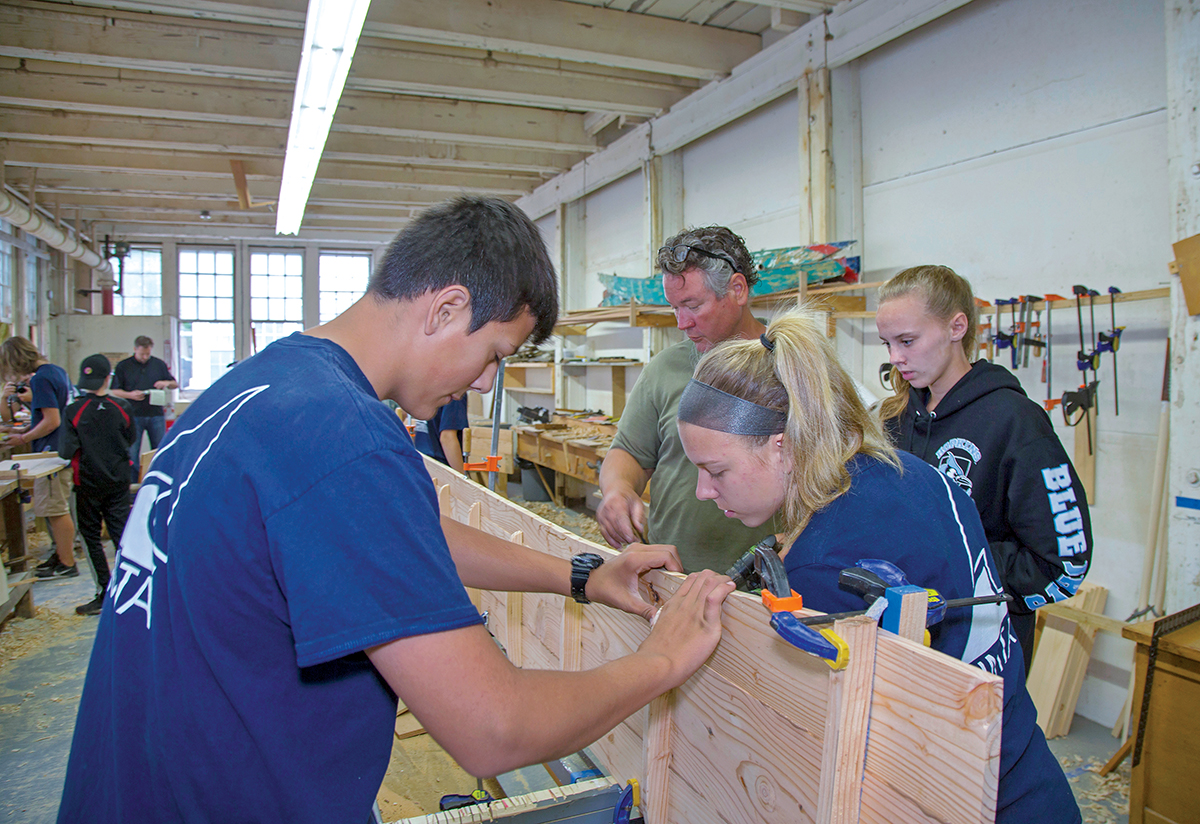A major concern for Rhode Island Marine Trades Association CEO Wendy Mackie is the large number of Ocean State marine-trades and composite-manufacturing workers retiring in recent years. “Everyone knows we have a graying workforce,” she said. “It’s not a joke, it’s a crisis.”
RIMTA is combatting those losses and starting young. Launched in 2009 in Newport, in partnership with IYRS School of Technology & Trades in Newport, the Youth Summer Boatbuilding Program enrolls 14- to 16-year-olds in a six-week marine-trades training and introduction course. Participants are paid up to $100 per week, based on attendance, to prepare them for the demands of the workforce.
Classes include safety and tool handling, team building, exposure to the water, leadership development and career-readiness activities, which culminate in the manufacture of a seaworthy vessel. This is all in the hopes of enticing the next generation of marine-trades, composite and manufacturing employees to replace the outflow Mackie mentioned.
Fourteen- to 16-year-olds are ideal, she said, because it’s “critical” teens remain active learners over the summer so they don’t disengage once school starts.
“Dropout prevention” is one aim of the program, she said, adding students who don’t benefit from learning in the traditional classroom setting are specifically targeted. “It provides an opportunity for them to have peer interaction in a way that is comfortable for them,” she said.
Eight students were enrolled in the program’s inaugural year and participation grew to 10 in 2010, and remained steady until 2015 when 12 students enrolled. The following year, participation doubled to 24 enrollees and a second site, in North Providence, was added.
This past summer 49 students enrolled. And with the help of Real Jobs Rhode Island and the Governor’s Workforce Board, RIMTA expanded the program to include the Newport Area Career and Technical Center, Tiverton High School, Bristol’s Herreshoff Marine Museum and two courses in North Providence at the Birchwood Middle School.
Mackie admitted RIMTA hasn’t kept track of the program’s graduates and is unaware if any pursued the career pipeline laid out for them.
However, a marine-trades career is still a few years out for 2017 Newport program graduate Charley Rudd of Tiverton. The 17-year-old, who is currently home-schooled, said he was enticed by the pay and thought it was a “good thing” to put on his resume.
While he said he would recommend the program to another student, he “wasn’t completely sure” if the experience would help him stand out in an applicant pool.
Unfortunately, the growing interest in the program may not be translating into the new generation of workers Mackie said is needed.
David M. Chenevert, Rhode Island Manufacturers Association executive director and makeRI chairperson, said while he hasn’t hired a graduate of the program to date, he thinks it’s a good idea. He applauds Mackie’s youth-oriented focus, saying the targeted demographic is at an age when students should be introduced to different employment industries in their communities.
Experiencing a similar “graying” effect, Chenevert is thankful programs such as this exist because it allows the industry to continue without a sudden employment hiccup.
“It’s great to fill the pipeline while [current] workers are retiring or thinking of retiring,” he said.
Terry Nathan, president of IYRS, a founding partner of RIMTA’s program, said the pipeline established by the youth program “is critical” to bringing new people into the industry.
Previously, he said, new blood came in through two paths – applications for entry-level positions or a “structured education environment” – but today, it’s important to recognize the possibilities behind extracurricular programs such as these.
“It’s a really good channel for getting younger and underserved people to understand the opportunities in the marine-trades [industry],” he said, in addition to introducing employers to the potential next generation of workers.
The challenge facing the marine-trades and manufacturing industry today, said Nathan, is “there are a lot of very talented people with a lot of institutional memory who have to be replaced as they continue to age.”
‘We’re looking to create a seamless pipeline for the future.’
WENDY MACKIE, Rhode Island Marine Trades Association CEO
Mackie and Nathan agree prior work experience, no matter the skill level, helps set entry-level applicants apart from the crowd during the interview process, especially if it’s within the desired industry.
He added: “No one strategy for replacing these people is likely to be adequate,” but, citing RIMTA’s Youth Summer Boatbuilding Program specifically, he said their “understanding of that is solid and they have done a good job of making sure people up and down the skills spectrum know about the opportunities in the marine-trades industry.”
Mackie is thrilled by the expansion of the program and continued interest from local students this year, but her sights are on further expansion down the road. She hopes a similar program, designed for eighth- and ninth-graders and focused on local marine-trades and manufacturing industries, will “help ease that transition” from middle school to high school.
“As an association, and an industry, we’re looking to create a seamless pipeline for the future,” she said.













